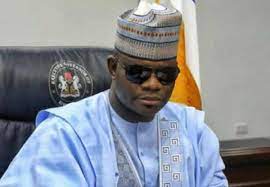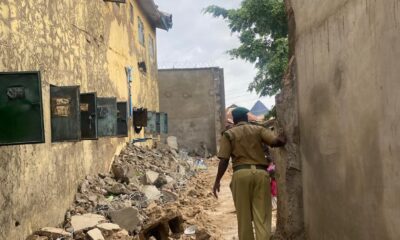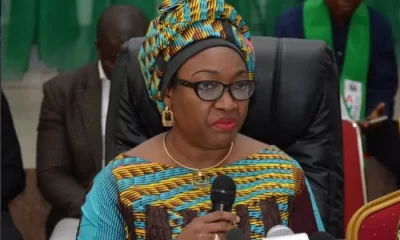News
Nigeria the state that refuses to fail
Nigeria continues to be plagued by corruption and poor governance, at least according to the global surveys of such issues.
Nigeria is an extraordinary country. Formed by combining 3 Protectorates from the British Colonial rule, located on the Bay of Bight in West Africa, Nigeria is home to over 200m people (officially), combines 3 major tribes and 250 smaller tribes, over 500 languages, immense physical beauty and topography that ranges from the lush tropical forests of the south, the Shebshi Mountains rising over 2,000m between the Taraba and Benue Rivers, and the majestic Sahara desert. The Niger River snakes over 4,000km through Guinea, Mali, on the Benin border before becoming truly awe-inspiring in Nigeria, emptying eventually into a vast delta (the Niger Delta of course), and subsequently into the Atlantic Ocean. The Niger River drains over 2 million square km of West Africa.
Nigeria gained its independence on Oct 1, 1960, amid tremendous optimism about the future of Nigeria and the future of Africa. The discovery of oil in 1951 was widely viewed as a great boon for Nigeria’s economy and people. However, despite this optimism, the road since independence has been long and difficult. A coup in 1966 took Nigeria from democracy to military dictatorship. A brutal civil war from 1967-70 resulted in the deaths of up to 2 million people.
The 1970s gave some economic respite, as the Yom Kippur War of 1973 drove up the price of crude oil dramatically, and the so-called ‘7 Sisters’ (the world’s private international oil company titans) all pitched their tents in Nigeria. GDP per Nigerian was over USD 1,000. The military leader then Gen. Yakubu Gowon quipped “the problem is not money but how to spend it.” There was massive investment in infrastructure – the so-called cement Armada had over 20 million tonnes of imported cement in the Lagos port at one time. In 1976, Nigeria hosted one of the most lucrative tennis tournaments in the world at the Lagos Lawn Tennis Club, headlined by the remarkable Arthur Ashe, reigning Wimbledon Champion. Unfortunately, the tournament came to an abrupt end on the semi-final day during an Ashe match with an attempted coup.
Nigeria by the numbers
1976 perhaps marked the high-water mark for the economy, as oil prices never again attained their 1973 peak (in real terms). Until the mid-1980s, Nigeria’s currency – the Naira – was worth more than the GBP. However, since then, the Naira has continuously devalued – today over 600 Naira to the GBP – a powerful signal of the economic decline of Nigeria.
Overall, since 1966, Nigeria has had 5 successful coups, 3 unsuccessful coups, the horrific civil war, and a return to democracy only in 1999, a democracy that remains very much a work in progress.
Despite the painful post-colonial period, both Nigerians and those from outside the country agree on one thing: Nigeria has enormous potential. In addition to unrivalled natural resources (oil, but also, gas, every mineral known to humankind), enormous quantities of arable land, and scenery that could create many of the world’s great future tourist destinations, the success of Nigeria’s music and Nollywood on the global stage highlight the vibrancy and creativity of her people.
However, achieving this immense potential remains elusive and, on many dimensions, Nigeria is an outlier and not in a good way. On a strict GDP basis – using the Purchasing Power Parity approach, at USD 1,075.69 billion Nigeria does not appear to be doing too badly. This PPP GDP per capita of USD 5,363 is ahead of India, and most other African countries.
This seemingly reasonable PPP GDP per capita performance masks extremely worrying official numbers:
- GDP per capita has in fact been declining every year, with GDP growth since 2015 less than population
- Official unemployment statistics from the NBS show 27.1%.
- Nigeria has the most people of any country in absolute poverty, approximately 100m.
- Nigeria has the most children out of school (13.5m United Nations).
- On the Human Development Index (HDI), Nigeria scores very poorly, with 0.539, behind African countries like Ghana (0.611) , Kenya (0.601), Cameroon (0.563).
- Embedded with the HDI, Nigeria has a very low life expectancy of 54.8, compared to India and 69.7 and China at 76.6 years.
- Income inequality is extreme; while over 100m people are in absolute poverty, Nigeria was forecast to be Africa’s largest importer of champagne when oil prices were rising. (It is the second highest importer of champagne in Africa behind South Africa).
- All of this is happening against a background of rapid population growth – estimated to be 3.2% pa by the Nigerian Population Commission. This means Nigeria will be the 3rd most populous nation in the world in 2050, and Lagos is projected to be the world’s most populous city at 40m. The Lancet recently projected that Nigeria will be the world’s second most populous country by 2100, surpassing China this century.
And Nigeria continues to be plagued by corruption and poor governance, at least according to the global surveys of such issues.
Transparency International’s 2020 Corruption Transparency Index scored Nigeria 25 out of 100 (higher is better), 149th of 180 countries. In contrast, its English-speaking neighbour in West Africa, Ghana, scored 43/100 with a ranking of 75th. Ivory Coast was also one of the world’s great improvers in the Corruption Perception Index in 2018, moving from 27 to 35/100 (that is, moving from equal to Nigeria to considerably better) and a ranking of 105th.
Despite the centrality of tackling corruption to the current government’s agenda, Nigeria’s score has sadly gone backwards from 28 in 2017 to 25/100 in 2020.
On Governance, the World Bank Group has a long-standing Worldwide Governance Indicators project, which ranks countries on 6 key dimensions: Voice and accountability, Political stability and Absence of Violence/Terrorism, Government Effectiveness, Regulatory Quality, Rule of Law and Control of Corruption.
Not surprisingly, Nigeria is not doing very well on these. Specifically, Nigeria fares very poorly on the Political Stability and Absence of Violence/Terrorism and Control of Corruption dimensions. But on almost every dimension, Nigeria does worse than its SSA peers, and what is perhaps more worrying is from 2008-2018, Nigeria has gone backwards on 4 dimensions.
The one dimension where Nigeria performs better than SSA is on Voice and Accountability – reflecting Nigeria’s boisterous NGO, press, and the general public who are increasingly bringing sunlight to Nigeria’s challenges every day.
Both those inside and outside of Nigeria are aware of the challenges in the Northeast of the country related to Boko Haram. Beyond these, we have the increasing number and severity of clashes between pastoralists (Fulani herdsmen) and farmers. This conflict is moving further and further south in Nigeria as climate change means that the Sahara is moving further and further south, increasing pressure on the lifestyle and livelihoods of the Fulanis.
Kidnappings also seem to be on the rise. While in the past, kidnappings might have been primarily concentrated in the South-South, it appears to be moving to become more of a nationwide phenomenon, though as always it is difficult to gather accurate statistics.
The one dimension where Nigeria performs better than SSA is on Voice and Accountability – reflecting Nigeria’s boisterous NGO, press, and the general public who are increasingly bringing sunlight to Nigeria’s challenges every day.
Both those inside and outside of Nigeria are aware of the challenges in the Northeast of the country related to Boko Haram. Beyond these, we have the increasing number and severity of clashes between pastoralists (Fulani herdsmen) and farmers. This conflict is moving further and further south in Nigeria as climate change means that the Sahara is moving further and further south, increasing pressure on the lifestyle and livelihoods of the Fulanis.
Overlaid on the Boko Haram, Fulani herdsman, and kidnapping security concerns is the general level of crime –ranging from petty theft to rape and murder – throughout the country. Of course, again, it is difficult to know whether Nigeria is making progress on any of these security issues. A free press that reports incidents, a vibrant NGO sector that often assists victims and the speed of light of the internet means that we are increasingly aware of insecurity incidents from all these sources.
In 2020, a new movement rose up, End SARS. Extra-judicial killings by security forces – including many by the infamous Special Anti-Robbery Squad – finally brought Nigerians – especially young Nigerians – out on the streets. Both the Federal and many State Governments acknowledged legitimate grievances and a painful and unknown process of examination of these issues has begun. The telling of history – and the way forward – was made much more difficult by the events of Oct 20, 2020, where security forces and unarmed civilians clashed at the Lekki toll gate. What exactly transpired is disputed by official parties to the events, but there is no question that the path to building trust between the government and its citizens has been made harder.
Kidnappings also seem to be on the rise. While in the past, kidnappings might have been primarily concentrated in the South-South, it appears to be moving to become more of a nationwide phenomenon, though as always it is difficult to gather accurate statistics.


 Politics17 hours ago
Politics17 hours agoBreaking: Prominent Nigerian Politician Is Dead(Photo)

 News21 hours ago
News21 hours agoFormer ECOWAS Court VP berates EFCC chairman over press briefing on Yahaya Bello

 Top Stories21 hours ago
Top Stories21 hours agoBreaking: Parents ‘suspect foul play’ as boy, 4, dies in BrickHall School Abuja

 Top Stories15 hours ago
Top Stories15 hours agoRunway Mishap: ART Kicks Against Dana Suspension, Cautions Festus Keyamo

 Politics20 hours ago
Politics20 hours agoBreaking: 118 Inmates Escape As Rainstorm Wreaks Havoc At Suleja Prison

 Top Stories2 hours ago
Top Stories2 hours agoMohbad’s toxicology result ready…what you need to know

 News3 hours ago
News3 hours agoBlack Market Dollar (USD) To Naira (NGN) Exchange Rate Today 26th April 2024

 Top Stories2 hours ago
Top Stories2 hours agoWitness Reveals How Ex-HoS, Oyo-Ita, Others Diverted ₦3 Billion To Private Companies






